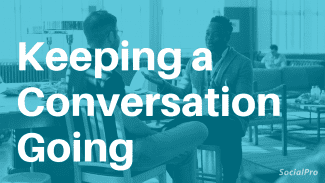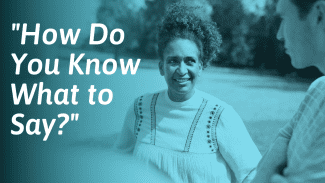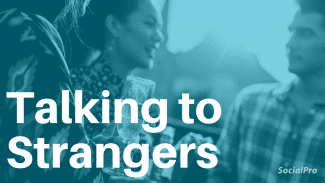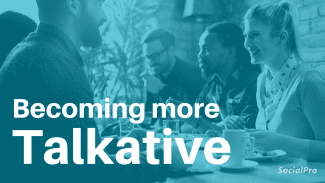Most people believe they are better listeners than they actually are.[1] A big part of the disconnect is that most of us were never taught how to listen well, which is a skill set that takes time and practice to develop. The good news is that anyone can develop these skills, even without taking psychology classes or reading books on the topic. Effective listening makes conversations more productive, but it also can also help you connect to people on a deeper level.[2][3]
This article will break down the strategies and qualities of a good listener and give you tips and examples to help you master the art of listening.
Sections
- How to become a better listener
- Bad listening habits to break
- What makes someone a good listener?
- What is active listening?
- Why are good listening skills important?
- How to know you’re getting better at listening
- Common questions
How to become a better listener
Listening is a skill that can be developed and improved with practice. Some of the steps and skills to becoming a better listener can seem obvious or simple but are difficult to do consistently. The 10 steps below are all proven ways to become better at active listening.
1. Listen more than you talk
The most obvious step towards becoming a better listener is also one of the most important—to talk less and listen more.[2] Talking too much provides fewer opportunities for others to chime in and can make conversations feel one-sided.
Work on talking less by paying more attention to how much you talk and how long you talk compared to the other person. When you feel like you’ve talked too much, be intentional about stopping yourself and giving the other person a turn.
2. Give people your undivided attention when they talk
One of the most important ways to become a better listener is to work on giving someone your complete and undivided attention. This means putting your phone away, stopping what you were doing, and just focusing on your conversation with them.[2][3][4]
Giving someone just 5 minutes of your undivided attention can leave them feeling more satisfied than having an hour of your partial attention.
If you have ADHD or are prone to distractions, try these tips to give people your undivided attention:[2][5]
- Silence your phone or put it out of sight to avoid being distracted by notifications
- Face the person and make eye contact with them
- Take notes during meetings at work or times when you need to remember details
- Redirect your attention outward to the other person if you get distracted by thoughts
- Take short breaks during long meetings or conversations to make it easier to focus
3. Slow down, pause, and allow more silence
When you talk fast, rush to finish people’s sentences or fill in every silence, conversations can become stressful. Each time you pause or allow for a brief silence, it offers a turn to the other person to talk. Comfortable silences and pauses create a more natural flow for a conversation while also giving both people more time to provide thoughtful responses.[4][6]
If talking fast is a nervous habit or if you’re uncomfortable with silence, try using some of these tips to practice slowing down and pausing:
- Focus on taking more breaths if you feel winded after talking
- Speak more slowly and deliberately, especially when saying something important
- Wait a few seconds after someone stops talking before you respond
- Pause every few sentences to allow others to chime in or ask a question
- Smile and make eye contact briefly to make silences feel friendlier
4. Use expressions and body language to show interest
Good listeners don’t just rely on words to respond to people who talk to them. They also rely a lot on facial expressions, gestures, and body language to signal their interest.[1][4]
Some of the ways you can become use body language to demonstrate you’re listening to someone include:[7]
- Leaning in or towards them
- Keeping your arms uncrossed and posture open
- Making good eye contact when they speak
- Using facial expressions to react (but try not to be judgmental)
- Try not to fidget or move around a lot
5. Ask follow-up questions about things they are interested in
Asking follow-up questions is another great way to prove you are listening and interested in what someone is talking about.[1][2]
For example, asking to hear more about a friend’s recent DIY project or promotion will often get them excited to open up and share more with you. By showing interest in the things, people, and activities that matter to other people, you also demonstrate that you care about them as a person. This leads to better relationships and more feel-good conversations that people enjoy.[1][3]
6. Get clarification when something isn’t clear
When someone says something that isn’t clear or doesn’t make sense, it’s important to get clarification to avoid misunderstandings. Clarifying is also a useful tool to make sure that you are on the same page with someone or understand what main points they’re trying to convey. Most people appreciate it when others ask for clarification and see it as the person making an active effort to understand them.[4]
Here are some examples of ways to ask for clarification when you’re unsure what someone means:
- “Could you explain that a little more? I just wanted to make sure I understand.”
- “Are you trying to say _________?”
- “I think I missed something. What I heard you say was _________.”
7. Reflect and summarize what they say to you
Other active listening skills to add to your toolbox are reflections and summaries, which both involve repeating or rephrasing what someone just said to you. A reflection is a shorter repetition, while a summary can involve tying together a few key points a person made.[3][4]
Both of these skills can help a lot in high-stakes conversations where you need to ensure you understand the exact details, process, or main points.
You can also use reflections and summaries in more casual conversations to be an active listener or make someone feel seen, heard, and understood.[1][3][4] In personal relationships, reflect and summarize the things that seem most important to the other person, instead of specific details that are less relevant to the main point.
Here are some examples of how to use reflections and summaries in an interaction:
- “What I’m hearing you say is…”
- “So what you need me to do is…”
- “It sounds like you…”
- “When he did that, it made you feel…”
8. Use “minimal encouragers” to keep a person talking
It can feel awkward to someone if you stay completely silent when they’re talking, and this is where minimal encouragers can help. Minimal encouragers are short phrases or gestures that you use to encourage a person to keep talking or let them know you’re listening. They act as guideposts and signs that help the other person know you’re on the same page and that it’s OK for them to keep talking.[1][4]
Here are examples of minimal encouragers to use when listening:[1]
- Saying “wow” or “amazing” when someone is sharing big news
- Nodding and smiling when you agree with someone
- Saying “huh” or “hmm” when someone tells a story about something strange
- Saying “yes” or, “okay” or “uh-huh” midway through a story
9. Go deeper to find the meaning behind their words
Certain conversations are more complex than others and may contain deeper messages or meaning. A good listener doesn’t just hear the words that a person says but is also able to decode the emotions, meaning, or request behind them. This is especially important when you’re having a heart-to-heart with a best friend, boyfriend or girlfriend, mother, or someone else close to you.
You can practice deep listening skills by trying some of these strategies:[1][4]
- Look for nonverbal cues that give you information about how they’re feeling
- Put what they’re sharing in the context of what you already know about them
- Listen for words they emphasize or words that feel emotional or important
- Put yourself in their shoes to imagine what you’d be thinking or feeling
- Sense when it feels like they want to say more and ask a follow up question
- Keep an open mind and try to avoid being judgmental or critical of what they’re saying
10. Use trial-and-error to find the right response
Being a good listener is not just about receiving and processing information but also about responding to this information in the right way.[2][3] This means being able to understand what response someone wants or needs from you, sometimes without them asking for it out loud. It is easier to do this with people once you get to know someone well, but a trial-and-error approach can help you figure this out with people you just met.
Here are some tips on how to figure out the “right” response to someone in a conversation:[7]
- Check to see whether open questions and minimal encouragers are enough to keep them talking about a topic and if not, consider finding a more interesting topic
- Look for signs of hesitation, social anxiety, or discomfort with longer pauses, eye contact, or specific topics and adjust until they seem more relaxed and at ease
- Ask how you can help someone who comes to you with a problem before just assuming they want advice, validation, or help solving the problem
What not to do: bad listening habits to break
Bad listening habits are things you say, do, or don’t do in conversation that get in the way of being an active listener. Many bad listening habits are caused by having poor conversation skills.
For example, not understanding how and when to take turns talking or how to give others enough turns to talk makes it hard to have effective conversations.[6] Other bad habits involve not paying attention to someone or not paying enough attention to the most important aspects of what they’re trying to communicate.[2]
Some of the most common habits of bad listeners are outlined in the table below.[2][3]
| Bad listening habits | Why it’s bad |
|---|---|
| Interrupting or talking over someone | Sends the message that what you have to say is more important than what the other person is saying and often offends them. |
| Pretending to listen or care | Can cause awkward responses or make others feel like you aren’t being genuine or authentic with them, making them trust you less. |
| Multitasking during a conversation | Divides your attention and limits your ability to actively listen, and can also make them feel dismissed or like they’re inconveniencing you. |
| Checking your phone or texting | Distracts you and keeps you from being able to be mindful and attentive in a conversation, and could also offend the other person. |
| Finishing someone’s sentences | Can lead you to jump to wrong conclusions while also making the other person feel rushed or frustrated during a conversation. |
| Getting stuck on the details | Can cause you to miss the main point the other person is trying to convey during a conversation. |
| Changing topics too quickly | Can feel dismissive and like you aren’t interested in something a person is talking about. |
| Talking about yourself too much | Can make you seem arrogant or self-absorbed, leading others to like and open up less around you. |
| Speaking too much | Can lead you to dominate conversations and give fewer chances or turns to talk to other people. |
| Rushing conversations or ending abruptly | Can cause the other person to become nervous or offended that they are bothering you or taking too much of your time. |
| Rambling on for too long | Can turn a dialogue into a monologue, boring people and making them less likely to seek you out for future conversations. |
| Rehearsing responses in your head | Can distract and preoccupy you, causing you to miss important parts of what the other person is saying. |
| Speaking too quickly and not pausing | Changes the pace of the conversation to feel rushed and adds pressure and tension while also making conversations one-sided. |
| Giving unsolicited advice or feedback | May offend someone who doesn’t need or want advice or may frustrate a person who just wants to vent |
| Being overly critical or judgmental | Makes others feel defensive, guarded, and less likely to open up to you, and can also make them feel less understood |
What makes someone a good listener?
Taking turns in a conversation doesn’t automatically make you a good listener, and neither does smiling, nodding, or pretending to care about what someone’s saying. Good listening is a skill that involves receiving, processing, and responding effectively in conversations.[1][2][3]
This requires listening more attentively to other people, but it also means proving you’re interested and engaged throughout the conversation. The best way to accomplish this is to use active listening skills.[2][3][4]
What is active listening?
Passive listening focuses on receiving information by staying silent and focusing on the words a person says, but active listening requires more attention, effort, and participation. Active listeners make other people feel seen and heard in a conversation. Rather than just using listening as a tool to get information from someone, active listening can also be used to build trust and closeness with people you care about.[3]
Active listeners demonstrate that they understand and care about what a person is saying to them by:[2][3]
- Asking open-ended questions to encourage someone to keep talking
- Using reflections to restate what someone says in a conversation
- Getting clarification about what someone means
- Summarizing the most important parts of what’s being said
- Reading social cues and understanding nonverbal communication
- Responding appropriately to what’s being said with words and expressions
Why are good listening skills important?
Listening skills are one of the main building blocks of communication and may even be more important than speaking. One of the best benefits of listening is that when it is done well, it can help to foster feelings of closeness and trust in your most important relationships. Great listeners are more likable and also tend to attract more friends, which can be another good reason to work on your listening skills.[1][2][3][4]
Some of the other benefits of being a good listener include:[1][2][3][4]
- Stronger and closer personal relationships
- Making better first impressions on people
- Fewer misunderstandings and conflicts
- Better leadership skills and co-worker relationships
- Improved performance at work
- Being viewed as more trustworthy
- Attracting friends and having more social supports
How to know you’re getting better at listening
Listening might seem simple, but doing it well takes a lot of skill, attention, and practice. When you devote yourself to this course of action, you will often notice changes in the way others interact with you. Your conversations may start to feel easier, more natural, and more enjoyable, and more people might initiate conversations with you.
Here are some common signs that indicate your listening skills are improving:[1][7]
- People initiate more conversations with you
- Conversations feel less forced and flow more naturally
- Friends and family are more open and vulnerable with you
- People at work stop by to chat with you more often
- People seem more excited and eager to talk with you
- Conversations feel friendlier or more enjoyable
- You have more random conversations with acquaintances or strangers
- Phone or text conversations happen more often and last longer
- You learn new things about people you’ve known for a long time
- People smile, use their hands, and are more expressive when they talk to you
- You remember more of what other people say in conversations
- You feel more mindful and present during conversations
- You are less stressed out about what to say during a conversation
- Listening doesn’t feel like you’re waiting for (or dreading) your turn to talk
Final thoughts
The skills and qualities of a good listener can be learned, developed, and strengthened with practice. Becoming more self-aware in conversations and working to give people your full undivided attention is a great way to begin this process. You can also work to develop active listening skills like asking more questions and using minimal encouragers, reflections, and summaries to keep people talking.[1][2][3][4] It can take some time to get used to these new ways of listening, but over time, they will feel easier and more natural.
Common questions
What does it mean to be an active listener?
Being an active listener means using verbal and nonverbal communication skills to show someone you’re paying attention during a conversation. Active listeners use reflections, questions, summaries, and gestures and expressions to show interest in what someone says.[3][4]
What does it mean to listen to the other person?
On a basic level, listening to someone means hearing and understanding what someone is saying. More skilled listeners use active listening to respond to people in ways that encourage them to keep talking and sharing. Active listening also helps them to hone in on key parts of the conversation.[2][3][4]
Why do some people listen better than others?
Like all social skills, listening is a skill that is learned and developed over time through real-life interactions. Most good listeners have just had more practice interacting with people or have made more of an effort to intentionally develop their skills.



















